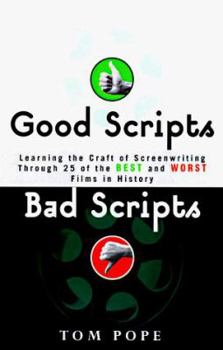Good Scripts, Bad Scripts: Learning the Craft of Screenwriting Through 25 of the Best and Worst Films in Hi Story
Select Format
Select Condition 
Book Overview
In this unique volume, respected screenwriter Thomas Pope offers an innovative and practical approach to teaching the craft of screenplay writing, in the process providing an engaging,... This description may be from another edition of this product.
Format:Paperback
Language:English
ISBN:0609801198
ISBN13:9780609801192
Release Date:April 1998
Publisher:Three Rivers Press (CA)
Length:232 Pages
Weight:0.50 lbs.
Dimensions:0.7" x 5.2" x 8.0"
Customer Reviews
5 ratings
If you've read Hauge, McKee, etc... this is the next step...
Published by Thriftbooks.com User , 16 years ago
There are a limited number of screenwriting books for near-professionals, and this is one of them. I've read all the best, and this one rates among them. Don't read it front to back, just read the sections of the movies you know. It also has an incredible analysis of "Pulp Fiction."
Enjoyable Read, Lots to Think About
Published by Thriftbooks.com User , 18 years ago
Mr. Pope has done in book form what I and countless other aspiring screenwriters do in our heads: analyze movies to figure out what did and didn't work. For the most part, I thoroughly agree with the author's analyses, but let's face it, opinions are like, well, you know, and his conclusions may be different than your own. The important thing is his logic is undeniable and thought-provoking. I wish he'd come out with an updated version with 25 new movies and analyses.
A book that tackles the tough stuff
Published by Thriftbooks.com User , 22 years ago
If you're looking for a book that lays out a mechanical blueprint for a screenplay, this book isn't for you.Yes, Pope is knowledgable about the sort of structural issues that every screenwriter should know in his or her sleep, but what he's really trying to do in this book is address the fuzzy, hard-to-put-your-finger-on problems that keep a screenplay from really working. I applaud him for this. Haven't we all seen movies that have a seemingly solid script -- with clear reversals, character development, well-situated plot points, a discernible three-act structure, etc. -- that still somehow fall flat? What is the mysterious X factor that this sort of movie is missing that we can't quite define? This is the problem that Pope tries to shed some light on.Actually, there are few "bad" scripts in this book, despite the title. Pope instead analyzes a lot of OK screenplays that could've been great if only a couple of script elements had been juggled about or refocused. This is incredibly helpful. In almost every example, I could see how the script in question could've really improved with just a few judicious tweaks. Pope shows me things in these movies that I hadn't seen just by watching them. (He even demonstrates how what seems to be a badly written script can create magic on screen -- for instance, Pope shows how "The Day of the Jackal" appears to break so many rules yet actually ends up being a very engrossing film.)Along with discussions of these "bad" scripts are breakdowns of very good scripts that are just as helpful.A couple of reviewers here have said that Pope's book only provides what a movie review or a post-viewing discussion with a friend could deliver just as well. First, I've never read a critic who spends as much time on deep-structure issues in a review as Pope does in his mini-essays. (OK, maybe Kael and Thomson, but that's about it.) Second, if you have a friend who can dissect the less-obvious failures of a script as well as Pope can, well, consider yourself seriously lucky. For those of us without such a friend, Pope's book is a godsend. It delivers its insights in such a conversational way that it's easy to miss how precise some of them are.No single book can teach all there is to screenwriting. It's still an art rather than a science (at least I hope it is). The best approach is to pick a handful of guides in order to gain differing viewpoints. After all, the more arrows you have in your quiver, the better. I'd recommend making Pope's book a companion volume to, say, Syd Field's "Screenplay," Denny Martin Flinn's "How Not to Write a Screenplay," Michael Hauge's "Writing Screenplays That Sell" or Robert McKee's "Story." None of these books supply all the answers on their own -- you can't really expect them to -- but together as a group they come pretty close.Good luck, folks. Work hard and write something beautiful. I know I'll be first in line at the cinema if you do.
Use it!
Published by Thriftbooks.com User , 23 years ago
This book is not mere film reviews; it isolates and defines those characteristics that make a film work or not work. Thus, any aspiring screenwriter should use it to their advantage. One of the best I've read, (and I've read most of them) it helped me write and sell my first feature script. A friend "borrowed" my copy. I'm buying another. First rate!
Fun to Read but provides great insight
Published by Thriftbooks.com User , 25 years ago
This is a great book. So many screenwriting books either dive deep into complex theory OR give us a Paint by Numbers formula to writing the new Hollywood blockbuster. Pope looks at 25 differing scripts and shows BY EXAMPLE what makes some work, some fail, and why no script is 100% PERFECT.





